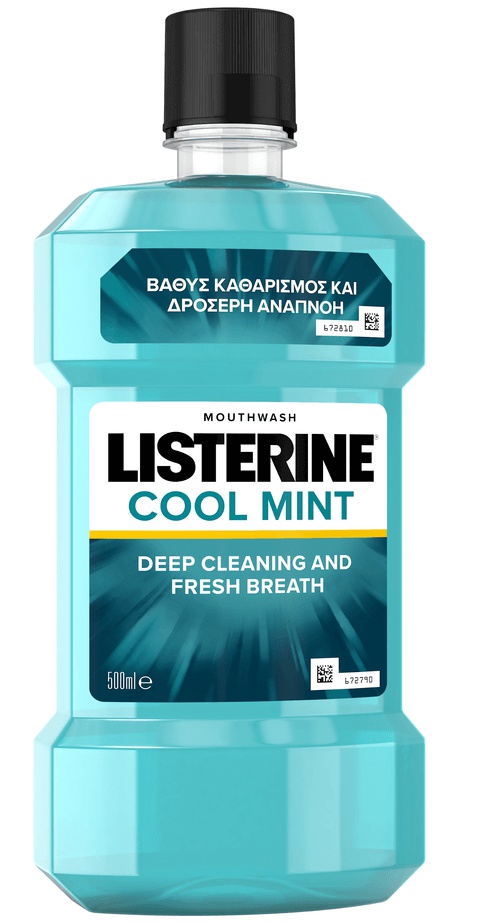
Cool Mint Mouthwash
Highlights
Key Ingredients
Other Ingredients
Skim through
| Ingredient name | what-it-does | irr., com. | ID-Rating |
|---|---|---|---|
| Purified Water | solvent | ||
| Sorbitol | moisturizer/humectant | 0, 0 | |
| Alcohol | antimicrobial/antibacterial, solvent, viscosity controlling | icky | |
| Poloxamer 407 | emulsifying, viscosity controlling, surfactant/cleansing | ||
| Benzoic Acid | preservative | ||
| Sodium Saccharin | |||
| Eucalyptol | perfuming | ||
| Flavor | |||
| Methyl Salicylate | perfuming, soothing | ||
| Thymol | |||
| Sodium Benzoate | preservative | ||
| Menthol | soothing | icky | |
| Ci 42053 | colorant |
listerine Cool Mint MouthwashIngredients explained
Good old water, aka H2O. The most common skincare ingredient of all. You can usually find it right in the very first spot of the ingredient list, meaning it’s the biggest thing out of all the stuff that makes up the product.
It’s mainly a solvent for ingredients that do not like to dissolve in oils but rather in water.
Once inside the skin, it hydrates, but not from the outside - putting pure water on the skin (hello long baths!) is drying.
One more thing: the water used in cosmetics is purified and deionized (it means that almost all of the mineral ions inside it is removed). Like this, the products can stay more stable over time.
It's a sweet tasting sugar substitute that helps your skin to hold onto water when used in cosmetic products. It also helps to thicken up products and give them a bit more slip.
Simply alcohol refers to ethanol and it's a pretty controversial ingredient. It has many instant benefits: it's a great solvent, penetration enhancer, creates cosmetically elegant, light formulas, great astringent and antimicrobial. No wonder it's popular in toners and oily skin formulas.
The downside is that it can be very drying if it's in the first few ingredients on an ingredient list.
Some experts even think that regular exposure to alcohol damages skin barrier and causes inflammation though it's a debated opinion. If you wanna know more, we wrote a more detailed explanation about what's the deal with alcohol in skincare products at alcohol denat. (it's also alcohol, but with some additives to make sure no one drinks it).
A synthetic big copolymer molecule that is used mainly as a solubilizer (make small amounts of oil-loving things soluble in water-based formulas) and gelling agent.
In general, poloxamers are interesting big molecules composed of three blocks: the middle block is an oil-loving part (from propylene oxide units, if you're into chemistry), while the left and right blocks are two water-loving parts (from ethylene oxide units). This means that poloxamers are partly water and partly oil soluble and thus they are surface active agents acting as emulsifiers and/or cleansers. The size of both the oil and water-soluble part can vary, and the numbers in the name of the molecule refer to both the overall size of the whole molecule and to the ratio of the water-soluble part.
This particular guy, Poloxamer 407, is a big one with significant water-soluble part (70%) hence it works as a solubilizer to make small amounts of oil-loving ingredients (such as essential oils) soluble in water-based formulas. It is also the best gelling and body giving agent out of the poloxamers commonly used in cosmetic products.
An Ecocert-approved, natural preservative that counts as gentle and non-irritating to the skin. Usually, it comes to the formula as part of a preservative blend as it's not enough on its own.




A helper ingredient that helps to make the products stay nice longer, aka preservative. It works mainly against fungi.
It’s pH dependent and works best at acidic pH levels (3-5). It’s not strong enough to be used in itself so it’s always combined with something else, often with potassium sorbate.
Menthol needs no introduction: it's the thing that causes the cooling sensation so well-known both from cosmetic products as well as a bunch of other things like chocolate, chewing gum, toothpaste or cigarette. It's a natural compound that comes from the essential oil of Mentha species (peppermint oil contains 40-50% menthol) and it gives them their typical minty smell and flavor.
As for skincare, menthol seems to be a mixed bag. Apart from the cool cooling sensation (that might last up to 70 mins!), it also has painkilling, itch reducing, antibacterial, antifungal and even penetration enhancing properties. On the other hand, it also seems to act as a skin irritant that increases trans-epidermal water loss (the water that evaporates from the outer layer of the skin) and thus contributes to drying out the skin.
You may also want to take a look at...
| what‑it‑does | solvent |
| what‑it‑does | moisturizer/humectant |
| irritancy, com. | 0, 0 |
| what‑it‑does | antimicrobial/antibacterial | solvent | viscosity controlling |
| what‑it‑does | emulsifying | viscosity controlling | surfactant/cleansing |
| what‑it‑does | preservative |
| what‑it‑does | perfuming |
| what‑it‑does | perfuming | soothing |
| what‑it‑does | preservative |
| what‑it‑does | soothing |
| what‑it‑does | colorant |






